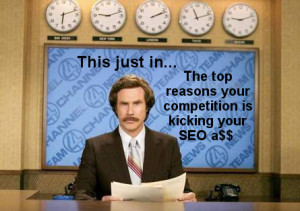 Two of the most common scenarios that prompt people to reach out to me about my SEO services go something like this:
Two of the most common scenarios that prompt people to reach out to me about my SEO services go something like this:
- “Someone contacted me last week and said they found my website online. How do I get more of that?”
- “My business is way better than my competition…so why are they ahead of me in Google and I can’t get on Page 1?”
I understand – nothing irks me more than when my competitors are beating me online and offline.
Can you relate?
And to make this more complicated, usually, it’s not just one factor that’s gotten them ahead, but several factors that are working together in conspiracy. Let’s review the top 7 reasons your competitors are ranking ahead of you in Google:
- A targeted keyword mapping plan: organizations who are at the top of Google know what keyword is mapped to each website page and they track this carefully (usually in an Excel spreadsheet). They have targeted 1-2 unique keywords for each page and have done so strategically
- Better on-page optimization: to be at the top, something must be telling Google that they are extremely relevant for that keyword. This is usually achieved through solid on-page optimization. Take note that over-optimization is not the answer. Sometimes less is better and over-optimized sites do worse, courtesy of Google’s Panda update.
- Social signals: does your competitor have a strong social media presence? Active accounts that prompt social engagement is an increasingly important factor for Google. Especially social media channels that are owned by said search engine, hint hint.
- Better links: this factor is one of the easiest to identify, and one of the hardest to do something about. Head over to http://www.opensiteexplorer.org/, enter in your competitor’s website link, and sort from highest to lowest domain authority. As with on-page optimization, more does not equal better. Five high quality links is more desirable than 500 low-quality links any day of the year.
- Trust: there are signals telling Google this site is to be trusted. Whether it’s the amount of links and social signals to the site, a low bounce rate, a high click through rate, or longer time on site (all metrics which can be found in Google Analytics), user data is telling Google this is a trustworthy site. Whether you think your competitor is trustworthy or not is another issue
- Fresh content: Google loves websites that invest in fresh, ongoing content on a regular basis. How often does your competitor publish blog posts, press releases, articles, or other content to the website? As with on-page optimization, and links, more does not always equal better.
- Friendlier technical elements: clean code, quick loading times, friendly on-page elements…these matter greatly and chances are the sites on top have done a good job on the technical side. Don’t make it hard for the bots to crawl your site, index it, and rank it appropriately. If the spiders have to do a lot of work, they may check out early.
If I’ve overwhelmed you (or depressed you thoroughly), chin up. You can get to all of this in time. The best way I suggest you get started is by getting high-quality, SEO’d blog posts consistently on your site, and to promote those via social media. Good luck and reach out if you have any questions!
Jenny Munn
Latest posts by Jenny Munn (see all)
- SearchGPT Has Landed – Here’s What Marketers Need to Know - November 7, 2024
- Download This Free Quarterly SEO Plan Template - October 7, 2024
- Four 2024 SEO Planning Tips for World Domination - November 16, 2023

2 Comments
Excellent post, Jenny! Lots of great, hands-on info here. And as a fellow self-employed professional services provider, I really like how you offer tips for things readers can do themselves, but (very) subtly let them know that you are available for help (and hire!) if needed. Kudos!
Hi Don! Thank you so much for chiming in and hope your SEO is still going well for you. Competitive research/snooping is always a fun topic. 🙂